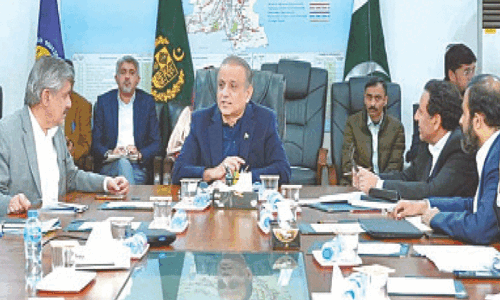
WASHINGTON: How would a strong relationship between the United States and India affect America’s relations with Pakistan?
Senator Ben Cardin’s question, asked at a recent hearing of the US Senate Committee on Foreign Relations, led to a long debate on this issue among US lawmakers, a senior State Department official and think-tank experts.
The hearing, called to review US-India relations, moved on to Pakistan when Senator David Perdue, a Republican member of the committee, asked Assistant Secretary of State for South and Central Asia Nisha Desai Biswal for an update on the Pakistan-India security issues and to share the State Department’s perspective on the relationship between the two countries.
Senator Cardin, the committee’s ranking Democrat, however, further expanded this debate when he asked the participants to help the panel “understand how the United States can strengthen its ties with India as it relates to our relationship with Pakistan”.
“Quite frankly, I don’t quite understand the full impact of that relationship,” he added.
Assistant Secretary Biswal enunciated the policy that the Obama administration borrowed from its predecessors: Pakistan and India need to resolve their bilateral issues on their own, the US can encourage them to stay engaged but it would not get involved.
“Clearly we have long encouraged India and Pakistan to engage in dialogues and to address some of the many issues that continue to be outstanding in that relationship,” she said.
“We have a very important relationship with each country and we seek to advance our interests with each country. We don’t see this as zero sum but we do recognise that for India and Pakistan there are a number of outstanding issues between both that would be benefited by dialogue.”
Ms Biswal also explained that countering and combating terrorism was “an important objective,” not just for India, Pakistan or Afghanistan but for the US as well.
“So these are areas that we try to support conversations across all of our bilateral relationships as well as pushing countries in the region to address it themselves,” she added.
She also emphasised the need to combat all terrorist groups active in the South Asian region, without any exception.
“We do believe that, increasingly, there is recognition that no kind of terrorist organisation will be acceptable, that you cannot differentiate between good terrorists and bad terrorists,” she said.
“That has been a stalwart tenant of our engagement in the region. And we do believe that we are starting to get that recognition back in at least the commitment that countries in the region are making to us,” she added.
But the US official also said that this commitment had to be translated into action. “We do need to see more in terms of actions in that space and we’ll continue to push on those issues,” she said.
Senator Cardin, while widening the debate, noted that the US had made a decision several decades ago to have a more strategic relationship with Pakistan.
“We have many issues with what Pakistan does, but we have a strategic partnership that’s critically important to our counter-terrorism activities,” he said. “As a result, there are economic issues between our two countries, including military issues that advance US interest.”
Turning to a group of experts the panel had invited to talk about US-India relations, Senator Cardin asked: “How do we handle Pakistan in our relationship with India? Because it seems to me it’s almost a subject we don’t talk about.”
The lawmaker also noted that his home state, Maryland, had a large Pakistani-American community and an equally large Indian-American community. “And, quite frankly, they’re much friendlier than the countries’ representatives are,” he observed.
“So, how would you recommend the United States handle its relationship with Pakistan as it relates to India?” he asked.
Alyssa Ayres, a senior fellow for India, Pakistan and South Asia at the US Council on Foreign Relations, called this “one of the most challenging questions” for dealing with US policy towards the region.
“Pakistan, in the past several years, has missed a number of opportunities to allow itself to better its ties with India, and to allow itself to open its economy further to some of the opportunities that its strategic location affords it,” she said.
Ms Ayers, an Indian-American, blamed Pakistan for keeping South Asia as one of the economically least integrated regions in the world. She said that while India granted Pakistan the most favoured nation status in 1996, Pakistan did not reciprocate and that’s why the two countries still had a “very limited relationship”.
Commenting on her effort to present India’s perspective, Senator Cardin said: “I understand that Pakistan has issues”, but asked her to explain what should the US be asking from India “in regards to how do we handle Pakistan in our relationship with India?”
“I think we should be asking Pakistan to do more on A, the trade openings, and B, the counter-terrorism questions,” Ms Ayers responded.
Published in Dawn, June 1st, 2016

































